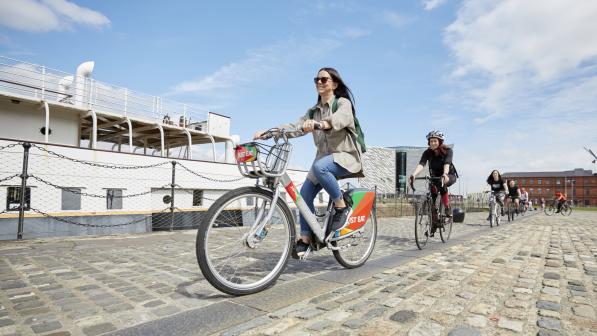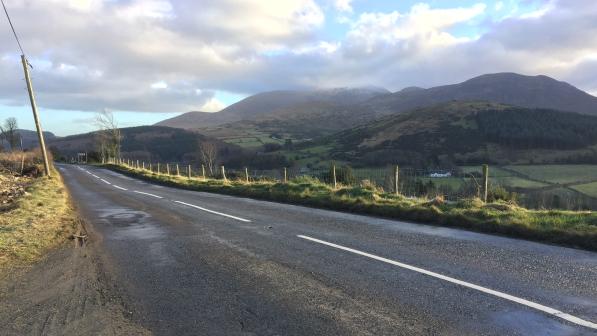Cycling in Northern Ireland

The main roads, big towns and cities (of which there are few) can get busy but stay away from these and the quiet rural roads will often have you wondering if you are on a private road due to the lack of traffic. The tourist hotspots can get busy during the holidays but even then it’s not that bad and with the growing popularity of cycling in Northern Ireland motorists are tolerant of cyclists.
Part of the beauty of riding in NI is that despite the relatively small area there is a lot of different terrain, often quite close to each other. There are hills aplenty, nothing Alpine in stature but certainly steep enough to test the legs. One this is for certain, there are very, very few flat roads in NI.
The capital city Belfast is embracing cycling with its own public hire bike scheme and cycle paths are springing up around the city. The city centre and its coastal surrounds are flat and perfect for an easy pedal but if you want to climb then the Black Mountain which overlooks the city can be reached fairly quickly giving incredible views of the city and the coastline for miles.
The Giro d’Italia started in Northern Ireland in 2014 and the route showcased the northern areas of the Province before heading across the border to a stage finish in Dublin. The crowds were incredible with Belfast closing down for the day and the public embracing the event. The Giro legacy sportive takes in the Mourne Mountains to the South which the race didn’t visit during its tenure in Ireland but are just as good as anything seen on the race route.
As mentioned above, the Mourne Mountains in the South East has the highest mountain range in the north and there are many roads which criss-cross the lower slopes of this range. The best bit about riding here is that it is beside the coast, so there’s always a good descent back to the sea giving stunning views as well as plenty of places to eat and drink.
To the north of the Province, the North Antrim Coast road is a must to ride if you are in the area and passes several world renowned landmarks including the Giant’s Causeway. Bushmills Whiskey Distillery is close by as are the Dark Hedges from ‘Game of Thrones fame. This stretch of coastline is relatively flat but if you fancy a climb then the Torr Head road won’t disappoint.
Heading inland the Sperrin Mountains range (the Sperrins) in the centre of NI will give any climber a test with lots of climbs packed together. The roads in the Sperrins are very quiet and you’ll more than likely be held up by livestock than traffic on the country lanes. Views are incredible and make the ascents worth it.
The Lakelands of Fermanagh are quite hilly to the west towards the border with the Republic but heading inland will give you a slightly easier ride. The roads to the north of here which skirt the border with Donegal are some of the least used in the Province and if you fancy jumping over the border you really will find the definition of quiet and remote.
One point worth noting, apart from motorways hardly anyone in Northern Ireland refers to roads with their official title ie A1, B35 etc. If you need directions tell the person you speak to where you want to go and they will let you know which roads you need to take usually via a series of towns and left / right turns. Best to bring a map just in case.
Cycling groups and clubs in Northern Ireland
CTC Northern Ireland (Belfast)
https://www.cyclinguk.org/local-groups/northern-ireland
https://www.cyclinguk.org/northern-ireland
0745 Rouleurs (Belfast)
http://www.cyclinguk.org/local-groups/745-rouleurs
https://www.strava.com/clubs/0745-rouleurs-27796
Dub Wheelers (Carryduff)
http://www.cyclinguk.org/local-groups/dub-wheelers
Graham Cycling Club (Lisburn)
http://www.cyclinguk.org/local-groups/graham-cycling-club
Killinchy Cycling Club (Comber)
http://www.cyclinguk.org/local-groups/killinchy-cycling-club
Kings Moss Cycling Club (Ballyclare)
http://www.cyclinguk.org/local-groups/kings-moss-cycling-club
http://www.pitchero.com/clubs/kingsmosscyclingclub/
Legacurry Freewheelers (Lisburn)
http://www.cyclinguk.org/local-groups/legacurry-freewheelers
Lower Omeau Residents Action Group (Belfast)
http://www.cyclinguk.org/local-groups/lower-omeau-residents-action-group
Northern Ireland Tourist Board (Belfast)
http://www.cyclinguk.org/local-groups/northern-ireland-tourist-board
Shankill Area Bike Club (Belfast)
http://www.cyclinguk.org/local-groups/shankill-area-bike-club
Southern Cycle For Health (Craigavon)
http://www.cyclinguk.org/local-groups/southern-cycle-health
Trappers Cycling Club (Belfast)
http://www.cyclinguk.org/local-groups/trappers-cycling-club
Unite Cycling Club (Ballymena)
http://www.cyclinguk.org/local-groups/unite-cycling-club
West Belfast Area Project (Belfast)
http://www.cyclinguk.org/local-groups/west-belfast-area-project
Belfast Boat Club Cycling Club (Belfast)
https://www.cyclinguk.org/group/belfast-boat-club-cycling-club
Openreach NI (Belfast)
https://www.cyclinguk.org/group/openreach-ni
Saintfield Development Association (Saintfield)
https://www.cyclinguk.org/group/saintfield-development-association
Integrity Cycling Club (Newtownabbey)
https://www.cyclinguk.org/group/integrity-cycling-club
Love Works Cooperative (Newtownabbey)
https://www.cyclinguk.org/group/love-works-cooperative
Flann Wheelers (Strabane)
https://www.cyclinguk.org/local-groups/flann-wheelers
North West Tandem Club (Londonderry)
https://www.cyclinguk.org/local-groups/north-west-tandem-club
Bcc Rouleurs (Ballymoney)
https://www.cyclinguk.org/group/bcc-rouleurs
Connect Cycling (Ballymena)
https://www.cyclinguk.org/group/connect-cycling
Team Knockagh Cycling Club (East Antrim)
https://www.cyclinguk.org/group/team-knockagh-cycling-club
Hunter Campbell Fat Boys Cycling Club (East Antrim)
https://www.cyclinguk.org/group/hunter-campbell-fat-boys-cycling-club
Burren CC (Burren)
https://www.cyclinguk.org/group/burren-cc
What to take with you on your ride
The only thing you really need for cycling is a bike. And maybe a phone, and credit card: in Britain you’re only a call away from any service you might need.
But unless money is no object, it’s wise to take a few things with you on a day ride. A saddlebag, panniers or bikepacking bags are best for carrying stuff. A front basket is second best. A rucksack is third best. Your sweaty back will soon tell you why.
Cycling short distances in jeans and t-shirt is fine, but on a long or strenuous ride – over ten miles say, or in hills – those jeans will rub and the t-shirt will get damp and clingy. Shorts or, yes, lycra leggings and padded shorts will be much comfier, and merino or polyester cycling tops wick away the sweat, keeping you dry and comfy. (They don’t have to be lurid colours.)
If rain’s in the air, pack a rainproof top. If it might turn chilly, take a fleece or warm top. But the thing you’re most likely to forget is the sunblock.
It’s remarkable how often you enjoy being out on the bike so much that you suddenly realise it’s getting dark. So take lights (which are legally required at night). They’re price of a sandwich, take no space, are easy to put on thanks to tool-free plastic clips, and the batteries last for ever.
Take a puncture repair kit (with tyre levers) and pump. Make sure it fits your valves, which will be either ‘Presta’ or ‘Schraeder’ – realising they don’t match is a very common roadside discovery! Carrying a spare inner tube (make sure it matches your tyre size) makes puncture repair much easier: mend the old one back at home. If you do get in trouble, some kindly passing cyclist will probably stop to help.
Using a helmet is a personal choice – they’re not legally required.
Cycling makes you thirsty, so take lots of water. Long-distance riders talk about ‘the bonk’ – a sudden loss of energy rendering you almost stationary. It’s miraculously and instantly cured by eating something sweet. On short rides you’re unlikely to run out of energy, but just in case, take a snack like flapjack, banana, chocolate or jelly babies.
Taking a packed lunch or picnic will save you money, though that hot drink and cake in a cosy cafe could yet prove very tempting!
Your phone GPS could be invaluable for showing where you are when lost; you can download free detailed UK maps and GPS software before your trip.
Paper maps are still useful, though, so take one: no power source or wifi signal required, and they’re great for suggesting possibilities or changes of plan.











